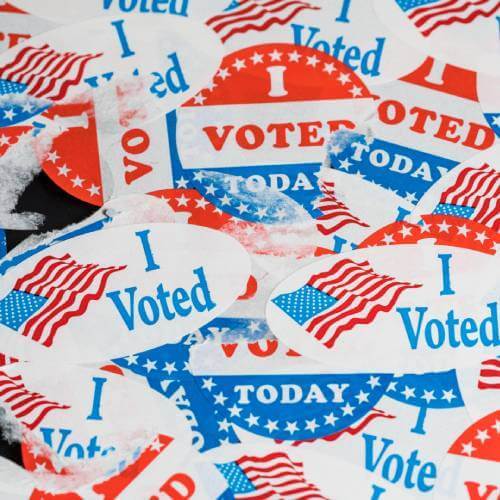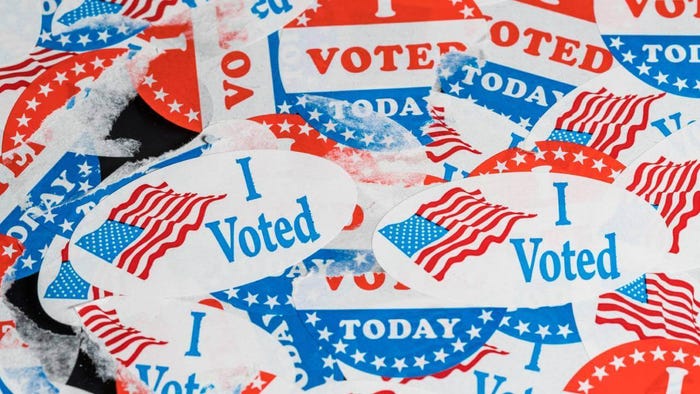These states have broadband on the ballot this November
Broadband is on the ballot for millions of US voters this year, with some states and counties seeking to amend their constitutions or bypass laws to make room for federal funding.

As voters head to the polls for this November's midterm elections, in addition to selecting candidates, millions of people will also be voting on broadband-related measures that could impact their communities for years to come.
According to publicly available information on state and local ballot initiatives up for a vote in the 2022 US general election, broadband is on the ballot statewide for voters in Alabama and New Mexico, as well as for some voters in Colorado. Here's what they're voting on and why:
Alabama
Voters in Alabama will weigh in on the "Broadband Internet Infrastructure Funding Amendment," which, if approved, will amend the state's constitution "to allow local governments to use funding provided for broadband internet infrastructure under the American Rescue Plan Act (ARPA) and award such funds to public or private entities."
The reason for the measure is that Section 94 of the Alabama Constitution currently prohibits the state from granting public money to local governments for private companies. Specifically, it reads: "The legislature shall not have power to authorize any county, city, town, or other subdivision of this state to lend its credit, or to grant public money or thing of value in aid of, or to any individual, association, or corporation whatsoever, or to become a stockholder in any such corporation, association, or company, by issuing bonds or otherwise."
If unchanged, that could be a problem. Unlike other federal broadband programs, like the Rural Digital Opportunity Fund (RDOF) and USDA's ReConnect, where funding is granted to companies by the federal government, ARPA rules enable municipalities to distribute a share of the state's allocated funds. Alabama's constitution complicates that.
Ratifying the state's constitution requires a three-fifths vote by the state legislature, followed by a simple majority vote by the electorate. The legislature passed the measure earlier this year with bipartisan support and a push from the Association of County Commissions of Alabama.
Figure 1:  (Source: Backyard Productions/Alamy Stock Photo)
(Source: Backyard Productions/Alamy Stock Photo)
"Our goal is to deliver high-speed internet services to all four corners of the state — urban and rural," said State Senator Clay Scofield, who sponsored the legislation, in January. "In order to obtain these results and get it right, we must pass this proposed amendment and send it to the people of Alabama for a vote."
If approved by the voters, according to Ballotpedia, Alabama's state constitution will be amended to read:
"The state, a county, or a municipality is authorized to grant federal award funds or any other source of funding designated for broadband infrastructure by state law to any public or private entity for the purpose of providing or expanding broadband infrastructure. The granting of funds by a county or a municipality to a private entity pursuant to this section must be approved at a public meeting held by the appropriate county or municipality."
Alabama Governor Kay Ivey signed legislation in January allocating $276 million in ARPA funds for broadband expansion, which is being administered by the Alabama Department of Economic and Community Affairs (ADECA).
According to an estimate from Broadband.Money, Alabama could also receive between $1.7 billion-$1.9 billion in broadband funds from the infrastructure law.
New Mexico
Voters in New Mexico have a similar decision to make.
Currently, Article IX of that state's constitution prohibits "lending, pledging credit, or donating to any person, association, or public or private corporation." A new amendment – entitled "Authorizing Funds for Residential Services Infrastructure" – would make an exception in the constitution for "essential" residential services, including "infrastructure that allows internet, energy, water, wastewater or other services provided by law," according to the National Conference of State Legislatures.
The amendment goes to the voters this November after a joint resolution was first passed in the New Mexico House in February of this year.
If approved by a majority of voters, the state constitution will be amended to read:
Nothing in this section prohibits the state from expending state funds or resources for the purpose of providing essential services primarily for residential purposes if the assistance is granted pursuant to general implementing legislation approved by a majority vote of those elected to each house of the legislature. The implementing legislation shall provide for accessibility to essential services primarily for residential purposes and include safeguards to protect public money and other public resources used for the purposes authorized in this subsection. As used in this subsection, 'essential services' means infrastructure that allows internet, energy, water, wastewater or other similar services as provided by law.
According to Broadband.Money, New Mexico could get roughly $798.3 million-$808.9 million in funds through the infrastructure law to close its digital divide.
Douglas County and Pueblo County, Colorado
In Colorado, voters in the counties of Douglas and Pueblo will decide if they want to opt out of a 2005 state law that restricts municipal use of funding for broadband.
The current law, known as Colorado Senate Bill 152 (SB-152), "excludes local governments from entering into the broadband market and prohibits most uses of municipal or county money for infrastructure to improve local broadband service without voter permission," according to the Colorado Municipal League (CML), a nonprofit, nonpartisan organization, which opposes the law.
As noted in a 2016 brief by consultancy NEO Connect, SB-152 was passed "at the urging of the largest telecom providers" and "took away local governments' ability to compete with the private sector within the broadband marketplace."
Organizations like CML, NEO Connect and Colorado Counties Inc. (CCI) have been fighting SB-152 on a local level. CML and CCI even compiled an opt-out kit "designed to help interested local government officials and staff to frame the issue as they consider their own ballot questions and work toward improving broadband service in their communities."
Indeed, if citizens of Pueblo and Douglas Counties vote in favor of this ballot measure they will join over 100 other municipalities that have already elected to "opt out" of the 2005 law, beginning with Glenwood Springs, Colorado, in 2008.
While the Biden administration's infrastructure law and the associated rules for the NTIA's multi-billion dollar broadband programs prioritize grants for municipalities, several states including Colorado have laws on the books that restrict or outright prohibit municipal participation in the broadband market. If Pueblo and Douglas vote in favor of the ballot measure it will broaden their options for using their share of the state's infrastructure funds. Colorado is estimated to receive $421.4 million-$555.3 million for broadband through the infrastructure law.
Finally, for history's sake: According to the National Conference of State Legislatures, the last time "broadband" was named in a measure on a statewide general election ballot in the US was in 2014 when New Yorkers voted on the Smart Schools Bond Act, which made $2 billion available for broadband and wireless connectivity installation at schools. That measure passed with 61.7% of the vote.
[Editor's note: Election Day in the US is November 8th. While you're here, take 30 seconds to check your voter registration.]
Related posts:
— Nicole Ferraro, editor, Light Reading, and host of "The Divide" podcast.
About the Author(s)
You May Also Like











